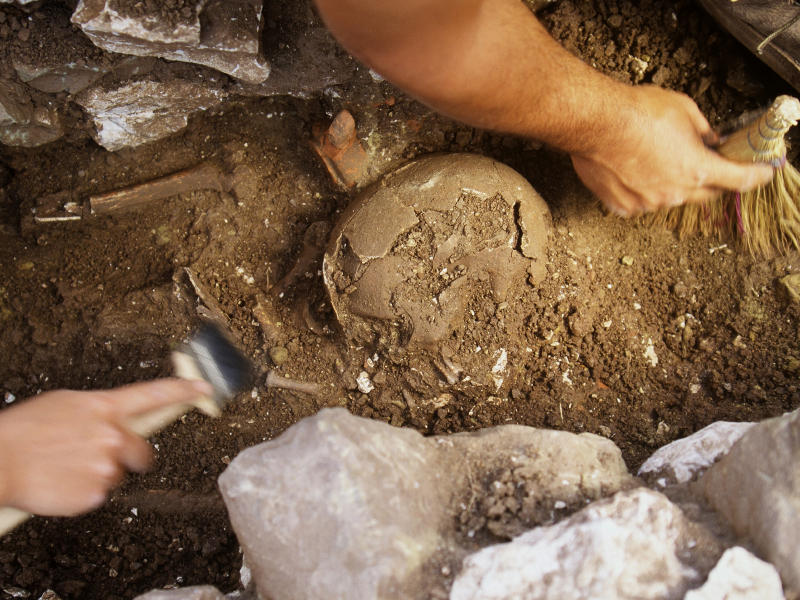Archaeologists suggest the Bronze Age ended 100 years earlier than previously thought


A free daily email with the biggest news stories of the day – and the best features from TheWeek.com
You are now subscribed
Your newsletter sign-up was successful
New research published in the journal PLOS One suggests that the traditional dates assigned to the Greek Bronze Age — and thus, the end of the Aegean civilization — may be wrong.
The Bronze Age is generally thought to have ended around 1025 B.C.E., but the new study suggests the Bronze Age could have ended as many as 100 years earlier. Archaeologists from the University of Birmingham used radiocarbon dating to analyze 60 samples from animal bones, plant remains, and charred building timbers, which they collected from the Assiros excavation site in northern Greece, outside the modern city of Thessaloniki.
Previous historical dates, meanwhile, were obtained from Minoan and Mycenaean pottery and other exported and imported objects from Egypt. However, the study researchers hoped to find a more exact date for the time period, since previous dating methods had "wide error margins" and have "been viewed by some archaeologists with suspicion." The researchers add that the study has provided the first sequence of absolute dates that are "in no way mediated by reference to historical context or predicted duration of any phase."
The Week
Escape your echo chamber. Get the facts behind the news, plus analysis from multiple perspectives.

Sign up for The Week's Free Newsletters
From our morning news briefing to a weekly Good News Newsletter, get the best of The Week delivered directly to your inbox.
From our morning news briefing to a weekly Good News Newsletter, get the best of The Week delivered directly to your inbox.
After using radiocarbon dating on the samples, the researchers discovered that their absolute dates were "systematically earlier than the conventional chronologies of southern Greece by between 70 and 100 years," according to the study. Their data is the most complete set yet for the Greek Bronze Age, from the mid-14th century B.C.E. to the 10th century B.C.E. The study authors add that their findings support the idea of "high rather than low Iron Age chronologies from Spain to Israel," but they note that the timeline is still "fiercely debated."
"This is a fundamental reassessment and is important, not just for Greece, but in the wider Mediterranean context," Dr. Ken Wardle of the University of Birmingham's classics department, told Phys.org. "It affects the ways in which we understand the relationships between different areas, including the hotly debated dates of developments in Israel and Spain."
A free daily email with the biggest news stories of the day – and the best features from TheWeek.com
Meghan DeMaria is a staff writer at TheWeek.com. She has previously worked for USA Today and Marie Claire.
-
 Colbert, CBS spar over FCC and Talarico interview
Colbert, CBS spar over FCC and Talarico interviewSpeed Read The late night host said CBS pulled his interview with Democratic Texas state representative James Talarico over new FCC rules about political interviews
-
 The Week contest: AI bellyaching
The Week contest: AI bellyachingPuzzles and Quizzes
-
 Political cartoons for February 18
Political cartoons for February 18Cartoons Wednesday’s political cartoons include the DOW, human replacement, and more
-
 Nobody seems surprised Wagner's Prigozhin died under suspicious circumstances
Nobody seems surprised Wagner's Prigozhin died under suspicious circumstancesSpeed Read
-
 Western mountain climbers allegedly left Pakistani porter to die on K2
Western mountain climbers allegedly left Pakistani porter to die on K2Speed Read
-
 'Circular saw blades' divide controversial Rio Grande buoys installed by Texas governor
'Circular saw blades' divide controversial Rio Grande buoys installed by Texas governorSpeed Read
-
 Los Angeles city workers stage 1-day walkout over labor conditions
Los Angeles city workers stage 1-day walkout over labor conditionsSpeed Read
-
 Mega Millions jackpot climbs to an estimated $1.55 billion
Mega Millions jackpot climbs to an estimated $1.55 billionSpeed Read
-
 Bangladesh dealing with worst dengue fever outbreak on record
Bangladesh dealing with worst dengue fever outbreak on recordSpeed Read
-
 Glacial outburst flooding in Juneau destroys homes
Glacial outburst flooding in Juneau destroys homesSpeed Read
-
 Scotland seeking 'monster hunters' to search for fabled Loch Ness creature
Scotland seeking 'monster hunters' to search for fabled Loch Ness creatureSpeed Read
